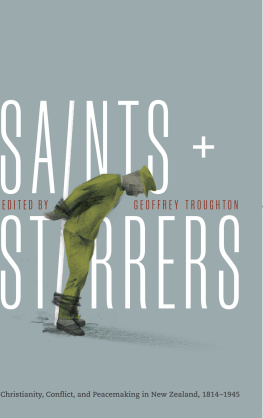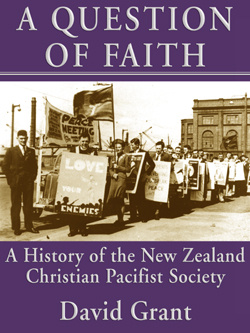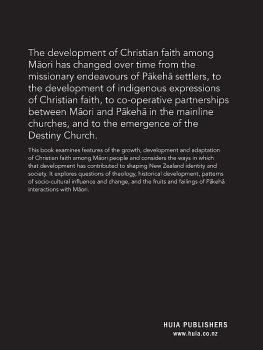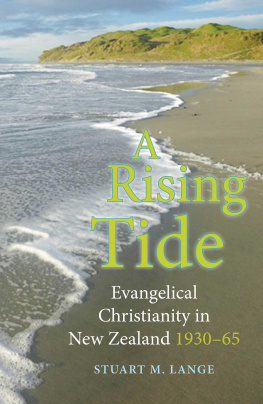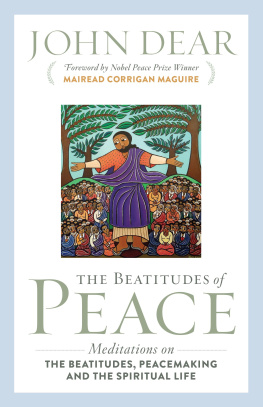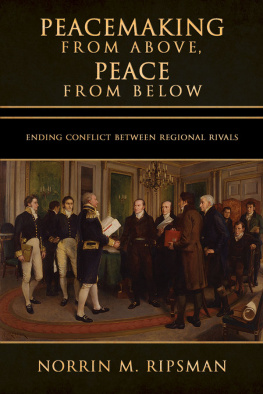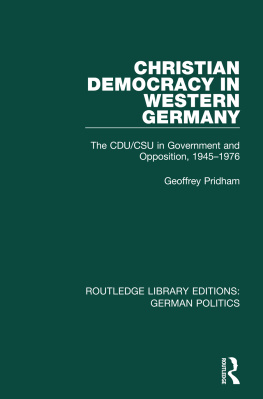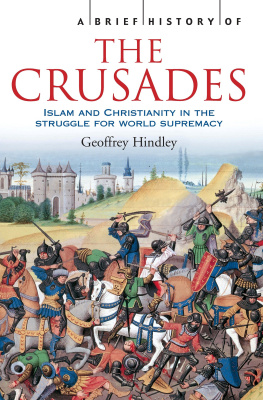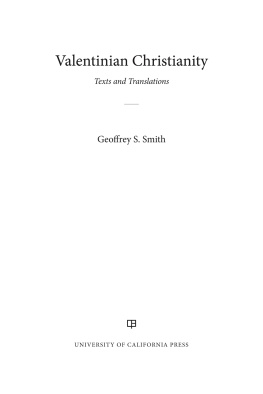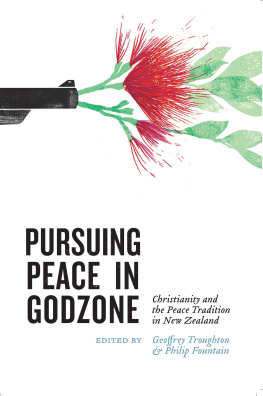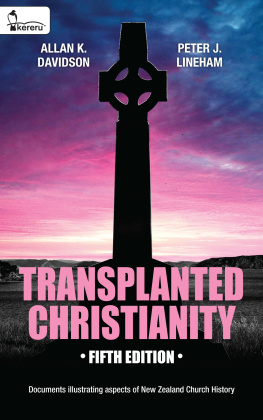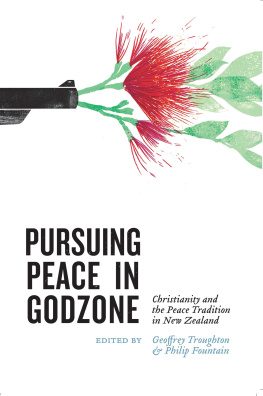

VICTORIA UNIVERSITY PRESS
Victoria University of Wellington
PO Box 600 Wellington
vup.victoria.ac.nz
Copyright editor and contributors 2017
First published 2017
This book is copyright. Apart from any fair dealing for the purpose of private study, research, criticism or review, as permitted under the Copyright Act, no part may be reproduced by any process without the permission of the publishers
ISBN: 9781776561643 (print)
ISBN: 9781776561421 (EPUB)
ISBN: 9781776561438 (Kindle)
A catalogue record for this book is available from the National Library of New Zealand.
Ebook conversion 2018 by meBooks
Contents
Geoffrey Troughton
Geoffrey Troughton
Stuart Lange
John Stenhouse
Harold Hill
David Tombs
Allan K. Davidson
Peter Lineham
Peter H. Ballis
David Grant
Notes on Contributors
Allan K. Davidson taught at St Johns College and the University of Auckland for many years. He has published extensively on the history of Christianity in New Zealand and the Pacific, most recently, New Zealand Methodist Chaplains and Ministers at War (2016). In 2010 he was awarded an ONZM for services to history.
Peter H. Ballis was most recently Head of Campus, Gippsland for Federation University Australia, and Head of Federation Business School, having served previously at Monash University as Pro Vice Chancellor at the Gippsland Campus. His primary expertise is in the sociology of work and organisations. Major publications include In and Out of the World: Seventh-day Adventists in New Zealand (1985) and, with Gary Bouma, Religion in an Age of Change (1999).
David Grant has published on many aspects of New Zealands social, cultural and political history. A leading historian of dissent, his books include: Out in the Cold: Pacifists and Conscientious Objectors in New Zealand during World War II (1986), A Question of Faith: A History of the New Zealand Christian Pacifist Society (2004), and Field Punishment No. 1: Archibald Baxter, Mark Briggs and New Zealands Antimilitarist Tradition (2008).
Harold Hill is a retired Salvation Army officer and adjunct teacher for Salvation Army Colleges in Wellington and Sydney. He has published Leadership in the Salvation Army: A Case Study in Clericalisation (2007) and Saved to Save and Saved to Serve: Perspectives on Salvation Army History (2017).
Stuart Lange is a Senior Research Fellow at Laidlaw College. His publications include A Rising Tide: Evangelical Christianity in New Zealand, 193065 (2013) and, with Geoffrey Troughton, Sacred Histories in Secular New Zealand (2016). He is also the writer and presenter of Te Rongopai: 200 Years of the Gospel in New Zealand, 18142014 (DVD, 2014).
Peter Lineham is Professor of History and Director of the College of Humanities and Social Sciences at Massey University, Albany. He has written extensively on New Zealand religious history, the history of British Protestant sects, and trends in contemporary religion. Among his recent publications is Destiny: The Life and Times of a Self-made Apostle (2013).
John Stenhouse teaches in the Department of History at the University of Otago. He is currently editing (with Diane Paul and Hamish Spencer) Eugenics in British Colonial Contexts: New Zealand, Australia, Canada and South Africa (forthcoming, 2017). Other projects include an historical geography of religion in New Zealand and a book on missionaries, science and medicine in the modern world.
David Tombs is the Howard Paterson Chair of Theology and Public Issues at the University of Otago. He has a particular interest in religion and violence, and in public and contextual theologies. He is author of Latin American Liberation Theology (2002).
Geoffrey Troughton is a Senior Lecturer in Religious Studies at Victoria University of Wellington. His research focuses on religion in New Zealand, the history of Christianity, and contemporary religious change. Major publications include New Zealand Jesus (2011), The Spirit of the Past (2011), with Hugh Morrison, and Sacred Histories in Secular New Zealand (2016), with Stuart Lange.
Preface
Yearning for peace is a fundamental human aspiration. To be secure, safe from threats, and free to flourish and thrive: these are common desires, shared by people the world over. As simple and unremarkable as they may seem, sadly, for too many people in too much of the world, such desires remain largely unfulfilled or realised all too fleetingly. New Zealand has never been immune from conflict and turmoil. Yet, as has often been noted, the nation has also been blessed with relative peacefulness. Surprisingly, however, this experience has not led to extensive critical exploration of the peace dimension in New Zealand history, or of the roots of the nations peace traditions. Nor have religious contributions received significant attention. This lacuna is predictable but also regrettable. For as the following accounts attest, New Zealand Christianity is replete with remarkable and often complex stories of peacemaking and opposition to war.
This volume aims to provoke fresh thinking about these issues, and about the history of peaceable ideas and practices within New Zealand. It focuses on various expressions of Christian opposition to violence and warfare, and provides the most substantial and broad-ranging examination of this theme to date. The book should be read as part of a larger project on Christianity and peace in New Zealand: another forthcoming volume, Pursuing Peace in Godzone: Christianity and the Peace Tradition in New Zealand, will address Christianitys relationship to peacemaking in more recent times. Both books are collaborative efforts; the impetus for them has arisen out of my recent focus on the peace dimension in early New Zealand missionary Christianity and its legacies.
Many thanks and acknowledgements are owed. I am grateful for the gracious, cheerful and energetic efforts of the authors who have contributed to this volume. I also express my appreciation to the reviewers, and others, who scrutinised sections of the book and offered valuable advice. My colleague Philip Fountain has been especially generous in his support and encouragement of this book, as well as offering insightful critique; he has also been a superb collaborator in the larger peacemaking project. As ever, I am grateful for the support of a remarkable group of colleagues in the Religious Studies programme at Victoria, and also for the outstanding work of the team at Victoria University Press. I thank Rowan Heap who has produced another superb, evocative cover design. I also appreciate the generous and timely support of various archives and libraries, including: the Alexander Turnbull Library, Wellington; the Hocken Library, Dunedin; the Presbyterian Archives Research Centre, Dunedin; and the Library and Image Services at Victoria University of Wellington.
This volume would not have been possible without generous support from a Royal Society of New Zealand Marsden Fund Grant (ID: VUW1412), and also from the Faculty of Humanities and Social Sciences at Victoria University. Most of the chapters that follow were initially delivered as papers for a conference that I organised with Professor Chris Marshall in November 2015: Peace, not war, shall be our boast: Historical, theological and contemporary perspectives on peace and Christianity in New Zealand. I acknowledge his support and the contributions of others on the organising committee, along with the Religious History Association of Aotearoa New Zealand, the College of St John the Evangelist, the National Centre for Peace and Conflict Studies at the University of Otago, and St Johns in the City, Wellington. Finally, I acknowledge the support of family and friends for their encouragement of this project, including and especially Adrienne, for her continuing love and forbearance.
Next page
